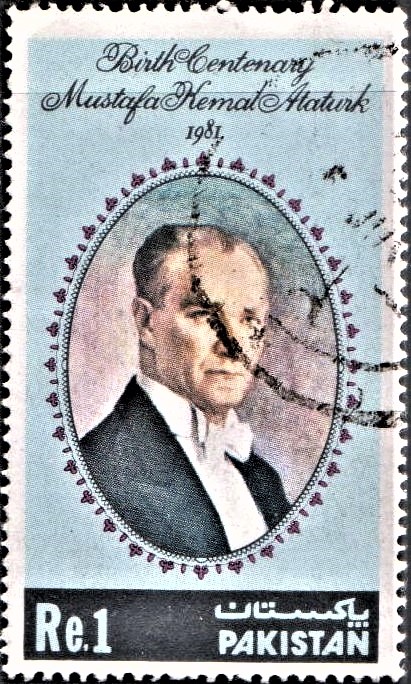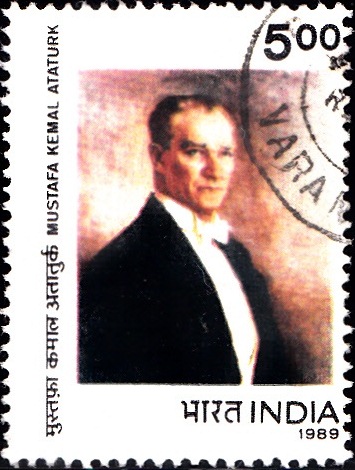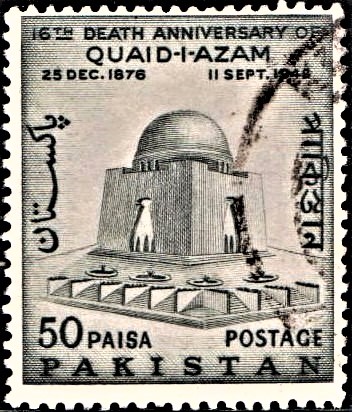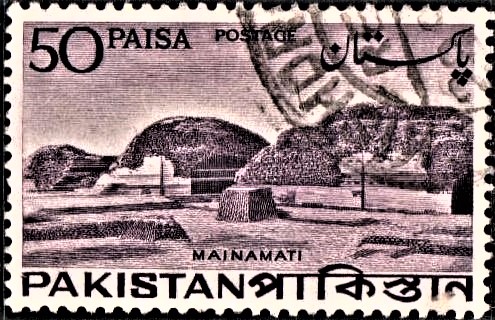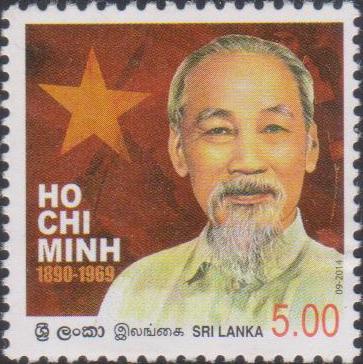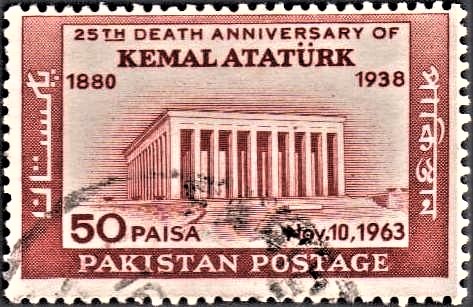
Ataturk Mausoleum, Ankara
A commemorative postage stamp on the 25th Death Anniversary of Kemal Ataturk (1880–1938), 1st President of Turkey :
 Issued by Pakistan
Issued by Pakistan
Issued on Nov 10, 1963
Issued for : Pakistan Post Office is bringing out a Postage Stamp on the 25th Death Anniversary of Ataturk to commemorate the brilliant achievements of that great Muslim leader who created modern Turkey with which Pakistan has long-standing fraternal pacts and friendship.
Design : Mausoleum of Kemal Ataturk with the words “25th Death Anniversary of Kemal Ataturk, 1880-1938, November 10, 1963”.
Type : Stamp, Postal Used
Denomination : 50 Paisa
Colour : Red
Size of Stamp : 39 x 25.1 mm
Size of Print : 36 x 22 mm
Perforation Gauge : 13 x 13½ (c)
Quantity Printed : 5,00,000
Number of stamps in each sheet : 80
Process of Printing : Intaglio
Printers : The Pakistan Security Printing Corporation Ltd., Karachi
Name : Ali Rıza oğlu Mustafa
Born on May 19, 1881 at Salonica, Salonica Vilayet, Ottoman Empire [now Thessaloniki, Greece]
Died on Nov 10, 1938 at Dolmabahçe Palace, Istanbul, Turkey
About :
- Kemal Ataturk, the founder of modern Turkey, was born in 1880 at Selanik, a city of the then Ottoman Empire. His father Ali Riza Efendi, a timber merchant, died when Ataturk was yet in his teens. In the beginning, Ataturk was admitted in a school employing modern methods of teaching but after his father’s death, he had to leave the school due to financial difficulties and to work as a farm hand near his native place. Soon, however, his mother persuaded him to resume his studies and, in course of time, he went to the Military School where, because of his outstanding abilities, his mathematics teacher gave him the title ‘KEMAL’ (meaning clever). Since then, he is known as “Mustafa Kemal”. He graduated from the Istanbul Staff College in 1905 as a Staff Captain and joined the secret society of Young Turks. Mustafa Kemal played an important part in the events of 1908.
- In the First World War, it was his brilliant action in the Gallipoli campaign (1915) which led to the defeat of the Allies. In 1919, he was appointed as Inspector-General in Anatolia where he is able to crystalise his movement at two momentous national congresses, Erzurum and Sivas. As an aftermath of the first World War, the Turkish Nationalist forces had to fight on several fronts. The most important front was in the west, where the invading Greek armies were trying to enlarge the territories they had forcibly seized. But under the brilliant leadership of Mustafa Kemal, the Turkish armies were victorious on all the fronts and finally on August 30, 1922, the Turks defeated the invading Greek armies and forced them to quit Turkey. With the signing of the Lausanne Treaty (July 24, 1923), the Treaty of Sevres was abrogated and Turkey’s independence, integrity and sovereignty was recognised by the world powers.
- Turkey was proclaimed as Republic on October 29, 1923. Since then, Turkey took great strides on the road to progress. Due to shortage and shyness of private capital, the foundations of Turkish industry were built as a state enterprise. And, Mustafa Kemal was successful in channelising the intense nationalism of the people into productive patriotism. In fact, his patriotism was the driving force behind the internal reforms as well as the basis of the new foreign policy of the Turkish Republic. Ataturk’s foreign policy was based on his sincere desire for peace and aversion to ‘foreign adventures’. “Peace in the country, peace in the world” was the rock-bottom of his foreign policy. The greatest achievement of Ataturk is his realisation of the real frontiers of the new Turkey.
- Ataturk had achieved in a comparatively short time what many had failed to accomplish in long stretches of years. Ataturk who died on November 10, 1938 in Istanbul was loved by his people as few leaders had ever been loved. In the words of a foreign newsman, he was a dictator who ‘dedicated to the hearts’. He was so much a part of his people and so much their driving force that after his death, life without him seemed impossible for them. The Republic he had founded and the reforms he had achieved were, however, so deep-rooted and durable that there was no chaos, no anarchy. And, the Turkish nation without interruption continued and still continues in its quest for a better life and a better world, guided by the ever-lasting principles of Ataturk.
- With the compliments of the Director-General, Pakistan Post Office, Karachi.



